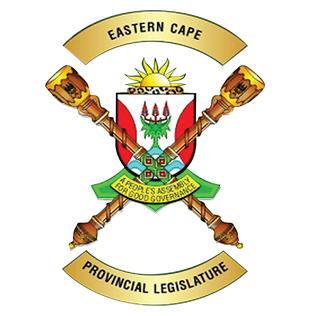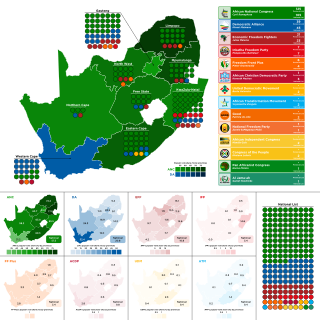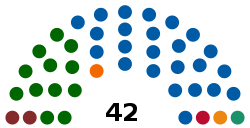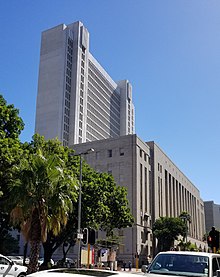
The National Assembly is the directly elected house of the Parliament of South Africa, located in Cape Town, Western Cape. It consists of four hundred members who are elected every five years using a party-list proportional representation system where half of the members are elected proportionally from nine provincial lists and the remaining half from national lists so as to restore proportionality.

The Eastern Cape Provincial Legislature is the primary legislative body of the South African province of Eastern Cape. It is unicameral in its composition, and elects the premier and the provincial cabinet from among the members of the leading party or coalition in the parliament.

Daniel Plato, known as Dan Plato, is a South African politician and a Member of the Western Cape Provincial Parliament since January 2022, previously serving from June 2011 until October 2018. He is the former mayor of Cape Town, a position he held for two nonconsecutive terms from May 2009 until June 2011 and again from November 2018 until October 2021. From June 2011 to October 2018, he was the Western Cape Provincial Minister of Community Safety.
In South Africa, a provincial legislature is the legislative branch of the government of a province. The provincial legislatures are unicameral and vary in size from 30 to 80 members, depending on the population of the province. Each legislature is chaired by a Speaker and a Deputy Speaker.

Bonginkosi Success Madikizela is a South African politician.
The nine provinces of South Africa are governed by provincial governments which form the second layer of government, between the national government and the municipalities. The provincial governments are established, and their structure defined, by Chapter Six of the Constitution of South Africa.

Marius Llewellyn Fransman is a retired South African politician and teacher. He served as Leader of the Opposition in the Western Cape Provincial Parliament from 2014 to 2016, and as Chairperson of the Western Cape African National Congress from 2011 to 2016. He served as Deputy Minister of International Relations and Cooperation in the cabinet of Jacob Zuma. From 2009 to 2014, he was a Member of the National Assembly. Fransman served as a Member of the Western Cape Provincial Parliament from 1999 to 2009, and again from 2014 to 2016.

General elections were held in South Africa on 8 May 2019 to elect a new President, National Assembly and provincial legislatures in each province. These were the sixth elections held since the end of apartheid in 1994 and determined who would become the next President of South Africa.

Alan Richard Winde is a South African politician and businessman. He is the 8th and current Premier of the Western Cape, having held the position since 2019. He has been a Member of the Western Cape Provincial Parliament since 1999. Winde is a member of the Democratic Alliance.

Beverley Ann Schäfer is a South African politician serving as the Deputy Speaker of the Western Cape Provincial Parliament since May 2019. She served as the Western Cape Provincial Minister of Economic Opportunities from November 2018 to May 2019. Between June 2014 and October 2018, she served as the Chairperson of the Portfolio Committee on Economic Opportunities, Tourism and Agriculture in the provincial parliament. She was the Cape Town City Councillor for Ward 54 from 2011 to 2014. She is a member of the Democratic Alliance (DA).

Cameron Muir Dugmore is a South African politician who is the Leader of the Opposition in the Western Cape Provincial Parliament. A member of the African National Congress, he has been serving as a Member of the Western Cape Provincial Parliament since 2014. He previously served in the provincial parliament from 1994 to 2009. He served as the Western Cape Provincial Minister of Cultural Affairs and Sport from 2008 to 2009, and as the Western Cape Provincial Minister of Education from 2004 to 2008.

The 2019 Western Cape provincial election was held on 8 May 2019 to elect the 6th Western Cape Provincial Parliament. It was the sixth provincial election held since the establishment of the provincial legislature in 1994.
Daylin Gary Mitchell is a South African politician who has been the Speaker of the Western Cape Provincial Parliament since December 2022. A member of the governing Democratic Alliance, he has been a Member of the Provincial Parliament since September 2015. He had previously served as the Provincial Minister of Transport and Public Works from May 2021 until April 2022 and then as Provincial Minister of Mobility until his election as speaker.

The Electoral Commission of South Africa (IEC) announced on 20 March 2019 that a record number of 48 parties had registered candidates for the national parliamentary election. This is 19 more parties that contested the 2014 national elections. In the provincial legislature elections, the total number of parties registering candidates were:

The 27th South African Parliament is the sixth Parliament of South Africa to convene since the introduction of non-racial government in South Africa in 1994. It was elected in the general election of 8 May 2019 and consists of the National Assembly and the National Council of Provinces. The National Assembly contains 400 members, while the National Council of Provinces contains 90 members. It was formally opened by President Ramaphosa's State of the Nation Address in a joint sitting on 20 June 2019.
General elections will be held in South Africa in 2024 to elect a new National Assembly as well as the provincial legislature in each province. These will be the seventh general election held under the conditions of universal adult suffrage since the end of the apartheid era in 1994. The new National Council of Provinces will be elected at the first sitting of each provincial legislature. Ever since the first post-apartheid election in 1994, the African National Congress has held a majority of seats in the National Assembly.
Wendy Felecia Philander is a South African politician serving as a Member of the Western Cape Provincial Parliament since August 2018. She is the chairperson of the Standing Committee on Health. She was previously a Member of the Mayoral Committee of the Drakenstein Local Municipality. Philander is a member of the Democratic Alliance.
Ricardo Denver Mackenzie is a South African politician who has served as the Minister of Mobility of the Western Cape since February 2023. A member of the Democratic Alliance, he has been a Member of the Western Cape Provincial Parliament since May 2014.
Mireille Mary Wenger is a South African politician who has been the Western Cape Provincial Minister of Finance and Economic Opportunities since May 2022 and a Democratic Alliance (DA) Member of the Western Cape Provincial Parliament since May 2014. She was Chief Whip of the Majority Party from May 2019 to May 2022.

Cayla Ann Tomás Murray is a South African politician and former civil servant who has served as the chairperson of the Standing Committee on Finance, Economic Opportunities and Tourism in the Western Cape Provincial Parliament and as a Democratic Alliance Member of the Provincial Parliament since August 2022.














